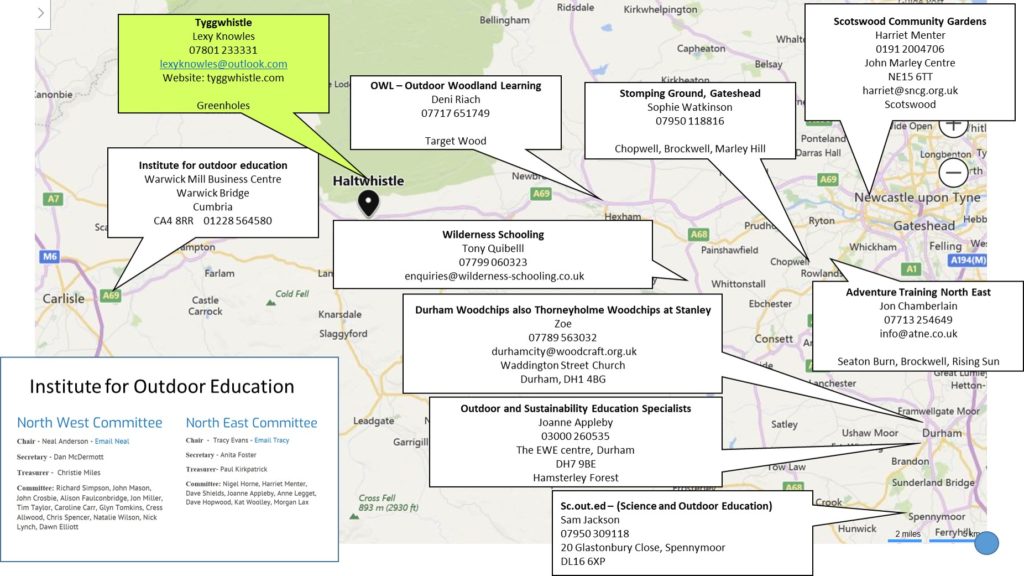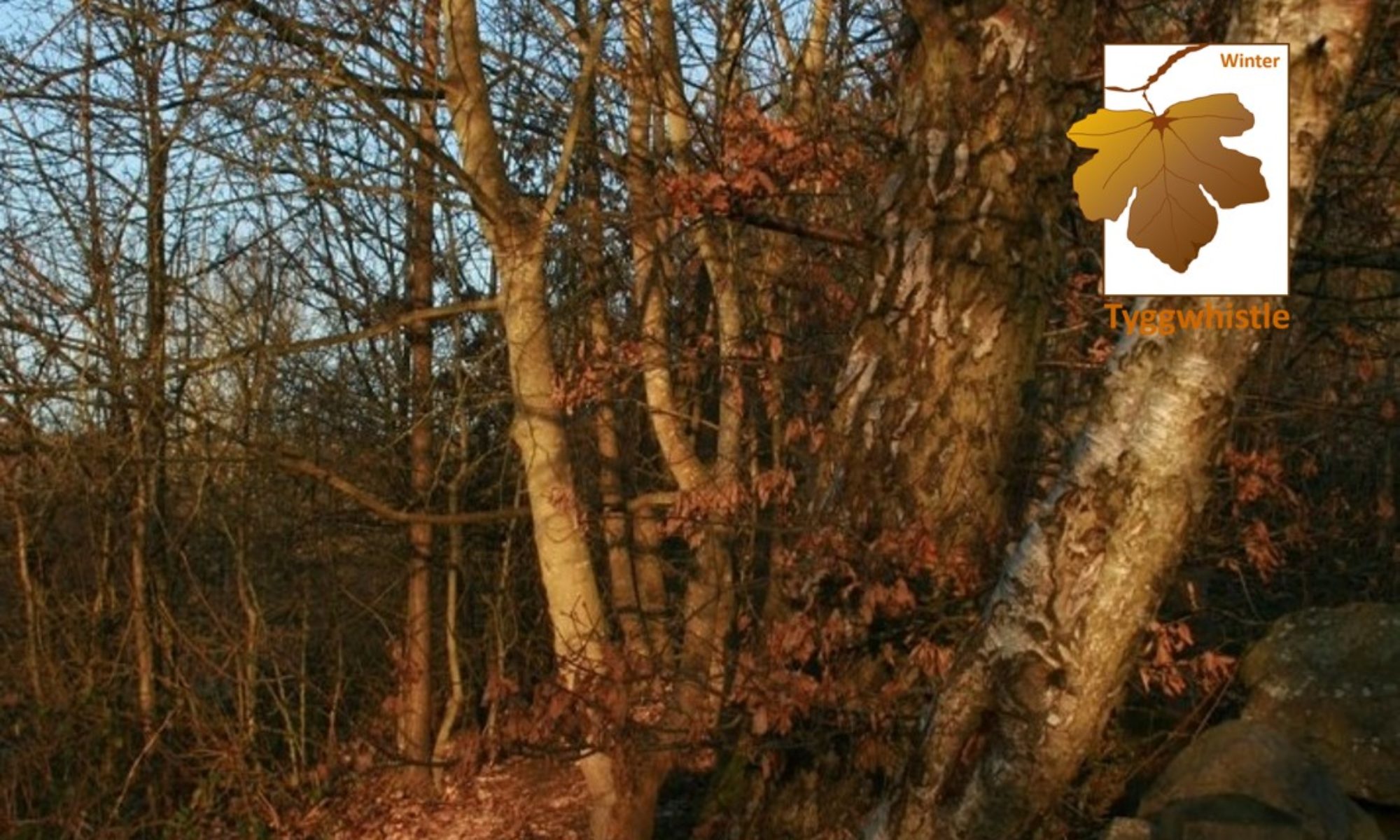The North East, and specifically Cumbria, has long been a centre for outdoor education, taking advantage of the stunning woodland, lakes and mountains of the Lake District. However, perhaps as a result of the easy access to managed outdoor activities and the relative scarcity of nature-deprived communities, the density of Forest School practitioners in the area is not high.
Notwithstanding, the main offices of the Institute for Outdoor Learning are located close to Haltwhistle in Warwick Bridge, just to the East of Carlisle. Although the Forest School Association is now independent of the IOL it is worth noting that, commercially, the two offers overlap and I have therefore included it in my analysis.
In terms of Forest Schools practitioners, these can be broadly subdivided in to 3 categories:
Qualified instructors operating out of a single primary school;
Qualified instructors offering a freelance service to schools and individuals;
Similar activities which are not directly affiliated with the FSA.Primary School settings
Primary School settings
I have not fully explored the first of these categories although I note that the Forest School concept is well embedded in local primary settings which take advantage of the local amenities and traditions of the North East.Forest School Providers
Forest School Providers
The two main, local concentrations are around Newcastle and Durham in the East and around Keswick/Lake District in the North West. The providers to the West of Haltwhistle are all located more than 60 miles from Tyggwhistle wood and opportunities for collaboration are low.
There are a number of providers in the Newcastle Durham access and I have summarised these on the info graphic attached to this discussion.
An analysis of these providers suggests that the principal markets for Forest Schools is primary settings and after school activities aimed at primary age children. However, a number of practitioners also offer services to secondary age schools. A less well developed area, vulnerable groups, is offered by a smaller group.
The closest practitioner to Greenholes, Deni Riach, operates under the name Outdoor Woodland Learning (OWL) and is located primarily at Target woods, just north of Hexham. Deni’s background is in youth work and she works flexibly with schools, youth groups and individuals as well as running sessions for women. Deni also offer woodcraft workshops.
Further East there are two well established providers who are also accredited to deliver NOCN Level 3 Forest School Leadership training. These are Adventure Training North East (ATNE), run by Jon Chamberlain and the Scotswood Community Garden Forest School run by Harriet Menter.
ATNE now focus on training practitioners although they do offer to partner schools with Forest and Bushcraft skills up to KS5.
Scotswood also train practitioners but have a broader direct delivery offer which encompasses primaries, secondaries, pupil referral units as well as youth groups. The garden, which is based at the John Marley Centre in West Newcastle, is also actively used by vulnerable young adults. Harriet has recently collaborated with Newcastle University to evaluate the impact of Forest School’s on primary and secondary age children with anxiety issues.
Close by, in Gateshead, Sophie Watkinson at Stomping Ground also offers a comprehensive range of services to main stream, alternative and community groups. Sophie uses a number of woodland setting including Brockwell Woods near Gateshead and Chopwell Woods further east. Chopwell Woods is the proposed location for the sessions I would like to run with Consett Academy and I am therefore keen to make contact with Sophie to let her know what I am doing and ask for her advice.Other providers
Other providers
Further south towards Durham there are two significant providers of similar activities although with slightly different emphasis.
Outdoor and Sustainability Education Specialists (O.A.S.E.S), based at the EWE centre in Durham is a well established centre focused on teaching children about sustainable environmental practices. Run by Joanne Appleby, who has been with the organisation for 16 years, it operates out of a centre on a primary school site It is also an accredited provider of practitioner training in NOCN Forest School Leadership.
A slightly different approach is taken by Science and Outdoor Education Specialists (Sc.out.ed). There offer is focused around taking science learning outside the classroom.
A similar offer is provided by Wilderness Learning who operate at a number of sites to the west and North of Newcastle. Wilderness Learning offer to provide Maths, English and Science learning within an outdoor context.
The danger of the Sc.out.ed and Wilderness approach is that it potentially becomes too adult led and departs from the Forest School principle of self-managed learning. However, this has to be balanced by the increasing pressure to evidence the value of outdoor learning in the current pressured environment of curriculum delivery.
Finally, I have looked briefly at related but alternative woodland based offers. One such provider is the Woodcraft Folk who were founded in 1924 as a reaction against the militaristic overtones of the Scouting Association. The Woodcraft Folk have roots in labour movements with a strong link to the co-operative society and they have a wider social ethos spanning pacifism and active citizenship. Although the original stronghold of the Woodcraft Folk is working-class areas of London and Coventry, it has gradually gentrified since the 1960s. Two branches operate in the North East, one in Thorneyholme and the other in Durham.Local Networks
Local Networks
It is clear from my review, that a working relationship with local groups would be advantageous and courteous. I have applied to undertake the First Aid accreditation through ATNE and intend to make contact with Deni Riach and Wilderness Training. I hope that there may be opportunities for Deni and myself to support each other. Deni is clearly a highly experienced practitioner whilst I may be able to capitalise on my contacts within education to open up new opportunities. I would also like to make contact with Wilderness training. Whilst their approach is not affiliated with the Forest School Association, I believe that finding a way to introduce curriculum learning in to play can not be dismissed. Ideas are either worth learning or they are not and much of the Maths, science and English curriculum are as conceptually useful, if not more so, in an outdoor environment than they are in a classroom.To help me link with local practitioners, I intend to explore membership of the Institute of Outdoor Education North West. This will allow me to find out more about similar ventures in the North West which have been harder to identify.

